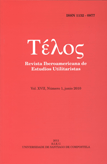Vol. 1 Núm. 1 (1992), Artículos
Recibido: 28-11-2012
Aceptado: 28-11-2012
There are many differences between the theories of Bentham and StuartMili specially in the ways in which both characterize the concept of pleasure.The concept, in turn, obviously has great influence on the utilitarian calculus. I am concemed in this paper with the issue of which of the two versions is most compatible with the liberal doctrine. In the procesa of establishing the compatibility of both versions with the liberal doctrine serious difficulties cannot be avoided, but this difficulties can be resolved easily in Bentham's theory. This conclusion has been disputed from many quarters. Ronald Dworkin has raised objections to Bentham's theory from the point of view of liberalism while Jonathan Riley has attempted at building a liberal utilitarianism based-precisely- on Mill's theory. I set out to demostrate that Dworkin's objection may be overcome and I introduce, with purpose in mind, the concept of voluntarily accepted extemal reasons. 1 also believe that Riley's intent is doomed to fail, because it introduces elements of perfectionism and patemalism into the theory.
liberalismo, Jeremy Bentham, John Stuart Mill, utilitarismo clásico






